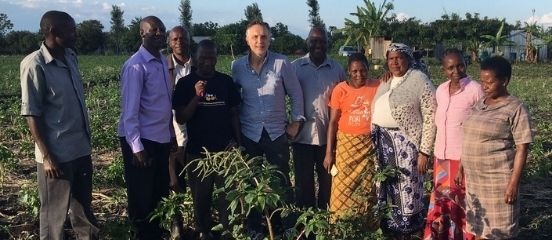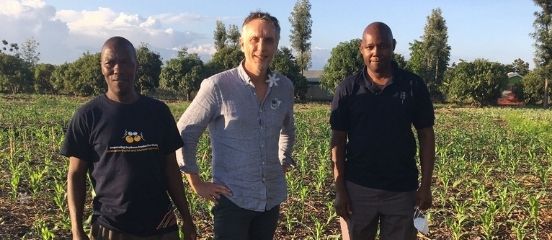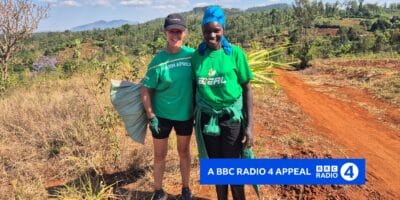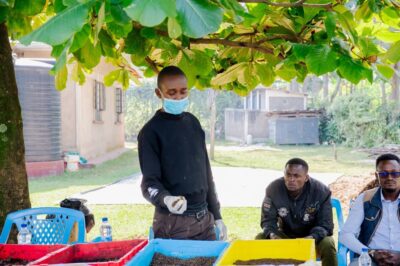Expert view
Kenya
11 December 2021
Dan Collison reports on drought in Kenya and Tanzania

By Dan Collison, Chief Executive
I’m just back from my first visit to Farm Africa teams and partners in Kenya and Tanzania. After 18 months of Covid-related travel restrictions it was amazing to finally meet so many colleagues for the first time, and to connect directly with our programmes.
Coming after my time at COP26, it was very concerning to see the impact of the drought that is affecting so much of the region, but also a reminder of the incredible relevance of Farm Africa’s work, not only in improving incomes and building sustainable livelihoods, but in achieving resilience to climate change.
Embu county is a dry zone to the east of Mount Kenya. Our programme there is promoting regenerative agriculture through a network of Village-Based Advisors (VBAs) who provide agronomic training and farming inputs to around 10,000 farmers. This approach improves soil health through the consistent application of some simple methods (mulching, spacing, planting in rows, and nitrogen fixing) and can dramatically increase yields.
Farmers that I met had increased production of maize and soya on their plots from 300kg per acre to up to 1,200kg per acre, producing a considerable surplus for sale. The VBAs are able to aggregate these higher levels of production into volumes that achieve a better market price for the farmers they support, while generating a margin for themselves, which gives them a built-in economic incentive to keep providing effective training.
Sirus, one of the VBAs, said to me that before Farm Africa started work “people used to think that farming doesn’t need any education” – but the project had shown that through effective knowledge transfer and community mobilisation, production can be increased while at the same improving soil health, including soil carbon levels.

The use of VBAs, 70% of whom are women, is proving so successful that the Embu county agriculture authorities are proposing that the approach be incorporated into national policy. This type of policy influencing is the ultimate goal of such projects, because that’s how to achieve results at scale, and it was very inspiring to see Farm Africa’s work being recognised like this.
My second visit took me to Bahi district in Dodoma region, in central Tanzania. It’s dry at the best of times, but drier than ever this year due to the failure of the short rains. It’s therefore a good place to be implementing our Climate-Smart Agriculture project, funded by the World Food Programme and the Irish Government, which is all about the introduction of drought-resistant and high-yielding sorghum varieties.
At the heart of this project is the painstaking process of generating the improved seeds – locally grown and nationally certified – enough for 20,000 farmers. Already these seeds, along with the introduction of good agricultural practices, are producing dramatic increases in production, from 350kg per acre before the project to 800 – 1,000kg now. The quality is high too, commanding an increase in market price from 250 Tanzanian Shillings/kg before to 550 Tanzanian Shillings/kg after, and demand is such that many of the farmers have agreed fixed contracts with buyers such as Tanzanian Breweries.
Simple improvements in post-harvest handling have also increased the amount that farmers have to sell, with improved threshing and storage increasing by more than 10% the amount that makes it from field to market. I met one farmer, Alfred Patrick, who showed me the impressive nine metric tonnes of sorghum in his store and explained that previously he would lose 15% of his harvest to rot, weevils and rodents, but now that’s reduced down to about 5%.
In addition to the annual sorghum harvest, the project is helping farmers to diversify production in the ‘off season’ through vegetable production, with a strong uptake among young adults, who are seeing good returns on the sale of leafy green veg, and also reporting an improvement in child nutrition as a result.
Our work is achieving transformational results with very poor farming communities who are vulnerable to climate change. I was inspired not only by the technical expertise of Farm Africa’s teams and partners, but also by the deep connection with communities that we work with, and the ability to promote lasting change. I’m really proud to be part of this work, and excited by the prospect of scaling it up further in 2022.




